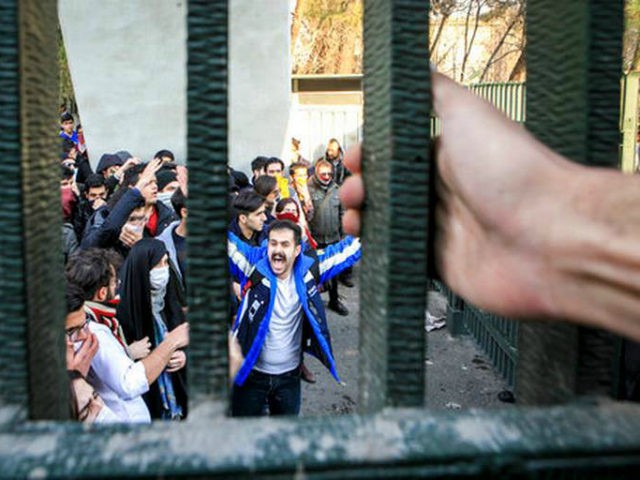Although 2018 is only days old, an event which not only has potential to be the story of the year but also set a new directional compass for Middle East stability is reportedly losing momentum.
Riots in Tehran have reportedly declined – though, with limited internet access in Iran, one cannot be sure – and the ever-loyal-to-the-mullahs Islamic Revolutionary Guard Corps (IRGC) declared they have ended it.
If true, the American media irresponsibly failed to give the uprising its deserved coverage. And the president they spent 8 years protecting, Barack Obama, deserves much of the blame for the IRGC’s ability to acquire weapons and funding to oppress its people.
If the protests persist, a profound future impact awaits not only the Iranian people but the Middle East and beyond. What happens in Iran impacts in Syria, Iraq, Libya, Yemen, Lebanon, Israel, Palestine, Russia, North Korea, Venezuela, Mexico, the U.S. and elsewhere.
The overthrow of a brutal theocracy that has ruled for almost four decades — one living up to its constitutional mandate to export the Islamic Revolution globally — would bring to a screeching halt the caliphate the mullahs have been building in the Middle East. A trickle-down effect by which Iran’s violent ideological expansion efforts collapsed would remove many storm clouds that gathered in the region since the mullahs came to power in 1979.
Much of the Middle East violence we witness today is easily traceable directly or indirectly to Tehran. We paid little notice to much of it because President Obama fought hard to keep it under wraps to push through a nuclear agreement with Tehran, securing his legacy — one ultimately doing nothing to make the region safer or tone down Iranian aggression.
The protests in Iran reportedly erupted over the economy and the mullahs’ failure to stimulate it after negotiating the nuclear deal that gave them the means to do so. Instead, they funded military takeovers in Yemen, Iraq, Syria, and beyond.
The mullahs focused their newfound billions on increasing their regional influence and creating instability rather than improving conditions for their own people. It is estimated at least 70 percent of Iran’s budget is committed to exporting the Islamic Revolution, thus denying Iranians the opportunity to enjoy the economic bonanza the deal made available to improve their standard of living.
As food and other essentials experienced exorbitant pricing increases, the Iranian people had had enough—and took to the streets. Unlike the normal government-orchestrated anti-U.S. protests leading to chants of “Death to America,” the chants now heard are “Death to the Dictator” — i.e., their Supreme Leader Ayatollah Ali Khamenei.
Unsurprisingly, women again are in the forefront of Iran’s protests. And, as the protesters’ numbers grew, these women courageously raised another issue critical of their country’s leadership. By doing so, they showed more backbone than Obama who, despite the opportunity to do so, refused to upset the mullahs by raising it himself: corruption.
Iran’s imams have gone from donkey-riding clerics only decades earlier to being among the wealthiest men in the world. Hundreds of companies in Iran operate under foundations controlled by Khamenei to which, it is estimated, over half the country’s budget is allocated and accounting for about 40 percent of the economy. Benefitting from this arrangement as well are the mullahs’ surrogate army of IRGC commanders. “Moolah” certainly has priority on the mullahs’ minds.
There are many world capitals closely watching developments in Iran. Protesters’ success would pull the plug on further Iranian support, at a minimum, for President Bashir Assad in Syria; for the Shiite militias controlled in Iraq; for the Houthi rebels fighting government forces in Yemen; for Hamas in the Palestine’s Gaza Strip; for Hezbollah and its various destabilizing activities in Lebanon, Venezuela and drug cartel-related operations in Mexico; and for North Korea’s nuclear and missile programs.
Somewhat reminiscent of Obama’s “hope and change” presidential campaign slogan, President Donald Trump announced a new foreign policy slogan for Iran, “Time for change.” No one can appreciate the significance of this more than those suffering under the Iranian caliphate’s yoke. Absent a leader emerging amongst protestors to unify their cause, while the opportunity for “change” may exist, sadly “hope” for a successful conclusion appears to be flickering.
Lt. Colonel James G. Zumwalt, USMC (Ret.), is a retired Marine infantry officer who served in the Vietnam war, the U.S. invasion of Panama and the first Gulf war. He is the author of “Bare Feet, Iron Will–Stories from the Other Side of Vietnam’s Battlefields,” “Living the Juche Lie: North Korea’s Kim Dynasty” and “Doomsday: Iran–The Clock is Ticking.” He frequently writes on foreign policy and defense issues.

COMMENTS
Please let us know if you're having issues with commenting.